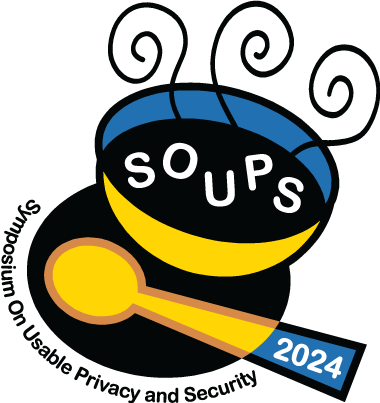The Twentieth Symposium on Usable Privacy and Security (SOUPS 2024) will take place at the Philadelphia Downtown Marriott in Philadelphia, PA, USA, on August 11–13, 2024. SOUPS brings together an interdisciplinary group of researchers and practitioners in human-computer interaction, security, and privacy.
Opportunities to Participate
- Call for Posters deadline: Thursday, May 23, 2024
- Call for Workshops Submissions deadline: Thursday, May 23, 2024
- Call for Lightning Talks and Demos deadline: Thursday, May 23, 2024
- 2024 John Karat Usable Privacy and Security Student Research Award Nominations deadline: Thursday, May 23, 2024
- Mentoring Program
- Pre-Conference Mentoring deadline: Monday, May 27, 2024
- Conference Mentoring deadline: Tuesday, July 30, 2024
About SOUPS 2024
Questions?
Review our Conference FAQs, and send direct queries via email:
Registration: conference@usenix.org
Membership: membership@usenix.org
Sponsorship: sponsorship@usenix.org
Student Grants: students@usenix.org
Proceedings Papers: production@usenix.org
Symposium Organizers
Technical Papers Co-Chairs
Technical Papers Committee
Invited Talks Chair
Lightning Talks and Demos Co-Chairs
Lightning Talks and Demos Junior Co-Chair
Karat Award Chair
Posters Co-Chairs
Posters Junior Co-Chair
Tutorials and Workshops Co-Chairs
Tutorials and Workshops Junior Co-Chair
Mentoring Co-Chairs
Mentoring Junior Co-Chairs
Publicity Co-Chairs
Email List Chair
Accessibility Chair
USENIX Liaison
Conference Sponsorship
Become a Sponsor: Sponsorship exposes your brand to highly qualified attendees, funds our diversity and student grants, supports open access to our conference content, and keeps USENIX conferences affordable. USENIX is a 501(c)(3) non-profit organization that relies on sponsor support to fulfill its mission. To learn more, please contact the Sponsorship Department with the conference name in your subject line.
The acceptance of any organization as a sponsor does not imply explicit or implicit approval by USENIX of the donor organization’s values or actions. In addition, sponsorship does not provide any control over conference program content. Questions? Contact the Sponsorship Department.






